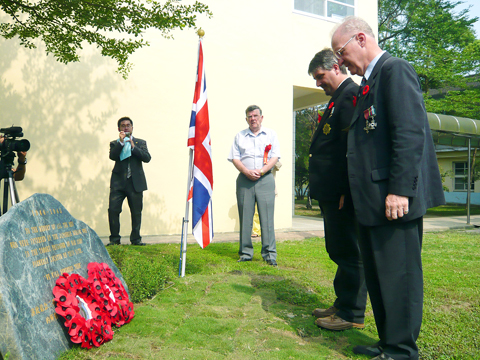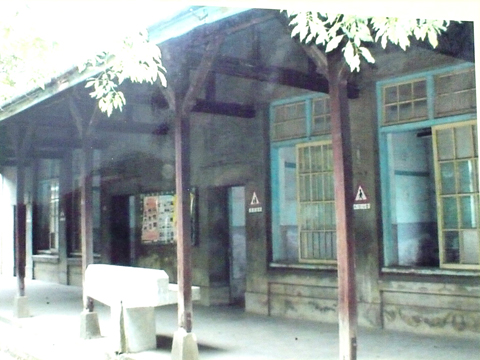Walking around the quiet, leafy campus of Gouba Elementary School in Douliou (斗六), Yunlin County, it is hard to imagine that the school was once used to house prisoners of war (POW) during World War II.
But from November 1944 until the end of the war, the school was home to the Toroku, or Douliou, POW Camp of the Imperial Japanese Army, or what POWs called “The Schoolhouse Camp.” Hundreds of US and British POWs were interned at the site before being moved to Shirakawa in Japan.

PHOTO: MO YAN-CHII
The location of the former camp was not confirmed until September 2000 when the Taiwan POW Camps Memorial Society visited the school in a bid to preserve the Japanese-style classrooms.
The original building, however, was torn down in 2003 out of safety concerns. The organization continued to communicate with the school, and was finally granted permission to erect a marble memorial at the site earlier this year.
“We should never forget the past. It’s not just a stone that we put up there, it’s what it meant for the POWs ... It is also an important piece of history for Taiwan and the local community,” said Michael Hurst, director of the organization.

PHOTO: MO YAN-CHIH, TAIPEI TIMES
Hurst traveled to the school with members and supporters of the organization on Saturday to commemorate the establishment of the memorial. At the ceremony, he told stories of the former POWs — who were too old to travel to Taiwan for the ceremony — to a group of school students and community members.
“All the surviving POWs are in their 80s or 90s, and it’s difficult for them to travel this far, and we don’t expect to see them coming back for memorials in the future,” Hurst said.
Although unable to be present at the memorial ceremony on Saturday, several POWs who had lived in the school camp shared their stories via e-mails.
“My work while I was there consisted of taking care of the vegetable garden plants ... we were always hungry and our thoughts were always of survival and getting back home,” US Army veteran Carl Pasurka said in an e-mail to the organization.
Raymond Harper of the US Navy said the POWs slept on cement floors in the classrooms and lived on rice and thin soup that only occasionally included vegetables.
Another POW, Alcide Benini of the US Army, described the Japanese commander in the school camp as a “pleasant man,” saying he had “probably the best Christmas as a POW” in 1944 because he helped lead church services.
Hurts said most of the POWs in the camp were in terrible physical condition, so they were not worked like slaves, as many were at the infamous “Hell Camp” in Kinkaseki, or Jinguashih (金瓜石), Taipei County. Some said they received good treatment in the camp during their imprisonment.
Gouba Elementary School principal Hsu Ching-hsuen (徐慶勳) said the school tore down the classrooms because of the lack of government subsidies for restoration work. However, he said the school valued what had happened on the school grounds and would pass on the history to its students.
Hsu said it was great to learn that local residents were friendly to the POWs, giving them sweet potatoes and cigarettes.
Still, the time in the school camp, as in the other 14 camps found in Taiwan, is an unbearable and dark memory for most POWs.
Although not a POW, Arthur Scholl, an 82-year-old US Navy veteran who now lives in Taipei, shared the pain of the POWs and the trauma the war has left them with.
“It’s only when I started to associate with the Taiwan POW Society that I was able to tell the stories in the wars,” he said.
Scholl talked in private about his experience fighting in World War II in the Philippines, in which he was almost killed on aircraft carrier, but was unable to speak at the ceremony because he was overcome with emotion.
The Japanese listed 4,344 POWs in Taiwan, with 15 POW camps. Except for the camp in Jinguashih, where some of the original structures remain, the other camps have been destroyed almost completely, Hurst said.
The recognition of the sites, however, will continue, he said.
The organization plans to hold a memorial ceremony at the remnants of the walls of Taipei Prison on Jinshan S Road on June 20 to commemorate the POWs who were executed in the old prison. It also plans to erect two more memorials at school camps in Yunlin County.
The stories of the POWs will be told even though the former POWs who spent part of their lives in Taiwan were unlikely to come to the island to tell their experiences in person.
“Our goal now is to bring their children and grandchildren here, and help them learn the past of their dads and granddad,” Hurst said.

Several Chinese Nationalist Party (KMT) officials including Chairman Eric Chu (朱立倫) are to be summoned for questioning and then transferred to prosecutors for holding an illegal assembly in Taipei last night, the Taipei Police said today. Chu and two others hosted an illegal assembly and are to be requested to explain their actions, the Taipei City Police Department's Zhongzheng (中正) First Precinct said, referring to a protest held after Huang Lu Chin-ju (黃呂錦茹), KMT Taipei's chapter director, and several other KMT staffers were questioned for alleged signature forgery in recall petitions against Democratic Progressive Party (DPP) legislators. Taipei prosecutors had filed

Taiwan would welcome the return of Honduras as a diplomatic ally if its next president decides to make such a move, Minister of Foreign Affairs Lin Chia-lung (林佳龍) said yesterday. “Of course, we would welcome Honduras if they want to restore diplomatic ties with Taiwan after their elections,” Lin said at a meeting of the legislature’s Foreign Affairs and National Defense Committee, when asked to comment on statements made by two of the three Honduran presidential candidates during the presidential campaign in the Central American country. Taiwan is paying close attention to the region as a whole in the wake of a

President William Lai (賴清德) has appointed former vice president Chen Chien-jen (陳建仁) to attend the late Pope Francis’ funeral at the Vatican City on Saturday on his behalf, the Ministry of Foreign Affairs said today. The Holy See announced Francis’ funeral would take place on Saturday at 10am in St Peter’s Square. The ministry expressed condolences over Francis’ passing and said that Chen would represent Taiwan at the funeral and offer condolences in person. Taiwan and the Vatican have a long-standing and close diplomatic relationship, the ministry said. Both sides agreed to have Chen represent Taiwan at the funeral, given his Catholic identity and

NEW WORLD: Taiwan is pursuing innovative approaches to international relations through economics, trade and values-based diplomacy, the foreign minister said Taiwan would implement a “three-chain strategy” that promotes democratic values in response to US tariffs, Minister of Foreign Affairs Lin Chia-lung (林佳龍) said. Taiwan would aim to create a “global democratic value chain,” seek to capitalize on its position within the first island chain and promote a “non-red supply chain,” Lin was quoted as saying in the ministry’s written report to the Legislative Yuan submitted ahead of the legislature’s Foreign Affairs and National Defense Committee meeting slated for today. The Ministry would also uphold a spirit of mutual beneficial collaboration, maintaining close communication and consultations with Washington to show that Taiwan-US cooperation